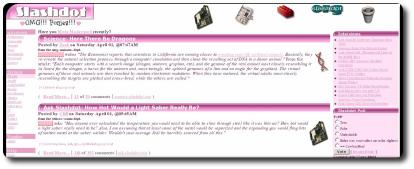The ‘New Netscape’? Anything Like the ‘New Digg’?
 IGG is changing. It potentially transforms itself for the better, but there are residual side effects. There will no longer be a tiered set of users. Top Diggers, including myself as a former active Digger, largely resent the new move.
IGG is changing. It potentially transforms itself for the better, but there are residual side effects. There will no longer be a tiered set of users. Top Diggers, including myself as a former active Digger, largely resent the new move.
To those unaware of these recent sizzling developments I’m referring to, Digg’s algorithm is being modified to be less (or more) democratic, essentially by weighting user’s votes as though they are not necessarily equal. It could bring about improvements, but it also raises many questions, affects morale, and lowers aspirations among new and senior contributers alike.
More latterly, several Digg contributers have been trying to assassin the character of Netscape, suggesting that the idea of removing avatars in protest came from Netscape or some shills it had recruited. It didn’t (see quotes below).
There are some Digg contributers who seek to blame Netscape for all the in-house trouble. But the removal of avatars, whose progress I followed from early stages, appears to have begun from the top and gone downwards with folks like DigitalGopher, P9, and George W. I didn’t realise what it was all about the first time I spotted the pattern. I thought top users were being banned or stripped of their identity. There are intersting discussion about the impact of the change.
Here’s another thought I had: if top diggers lose power and are then perceived as ordinary, that will a considerable turn-off, which is sure to stop them from participating much, let alone ‘game the system’, as Kevin Ross called it (impulsive accusation perhaps).
So what should we now expect from top contributers? Just a submission here and there to keep up appearance and be part of the scene (presence), not ‘becoming the next Albert Pacino (top all-time contributer)’, who long ago decided to hang up the towel.
Lastly, here is are some bits from an interview with the top Digger, who quit abruptly.
The other users did not remove their avatars in support of me. It was in protest of Kevin’s message as well as the verbal filth that many Digg users were spewing at Digg’s top submitters.
The #33 Digg user, Curtiss Thompson, had many of the same things to say, in an email to Wired’s Michael Calore:
The blog post by Kevin Rose in response to the Digg community’s outcry about top diggers gaming the system has caused many top diggers to be singled out from the community and buried not on the merit of their content, but on their unfounded accusations that the top Diggers were manipulating or “gaming” Digg’s democratic system. Not only was the blog post misrepresented, but it was misinterpreted, by the Internet community to support one Digg user’s claim that The Digg System Is Being Gamed By Top Users.
Side notes:
- A Digg friend was kind enough to have me mentioned and even credited. Thanks, buddy!
- I had an interview about my recent move to Netscape/AOL. I will post a pointer to the text (or a copy thereof) in my blog as soon as it goes live.
Update: some comprehensive, link-rich coverage has just been posted on the topic.






 Filed under:
Filed under: 

 week ago I was trying to find an alternative Web-based feed-reading software. I was looking for merely anything, apart from desktop-bound solutions or
week ago I was trying to find an alternative Web-based feed-reading software. I was looking for merely anything, apart from desktop-bound solutions or 
